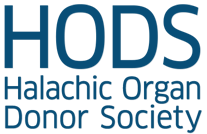High School Program
High School Program For Students
General Info about Organ Donation
Group Exercises
Ideas for Writing a Paper
Other Resources
Dear Student,
This page will give you some background information about medical and halachic issues concerning organ donation and will offer you a few ideas to write a paper or create a project for your high school.
You might want to spend a minute and learn a little bit about the Halachic Organ Donor Society by clicking here.
General Info about Organ Donation
There are two types of organ donation: removal of organs from a person who has recently died (deceased donor), or from a living donor. In the first case, a deceased donation, allows 8 life-saving organs to be transplanted: the heart, lungs (2), kidneys (2), liver (split in 2) and pancreas. This can save 8 lives. Skin and corneas may also be recovered. In cases of a living donor, a person will voluntarily opt to donate one of his/her kidneys. Everybody is born with two kidneys yet only needs one to live.
In the United States there are 120,000 people on the transplant waiting list and about 20 people die every day waiting for an organ. In Israel, there are 1,000 on the waiting list, and 100 die every year. Unlike other disease from which people die because there is no known remedy, medicine has a cure for organ failure: organ transplants. Unfortunately not enough people agree to donate their organs and as result many lives are unnecessarily lost.
This issue is particularly important to the Jewish community since Jews have a significantly lower rate of organ donation. In Israel 14% of the population has elected to be organ donors compared to 45% of the United States population.
Click here for a Group Discussion about Organ Allocation
Click here for Ideas for Writing a Paper
Click here for Other Resources
Questions and comments can be directed to office@hods.org or 1-646-599-3895.

